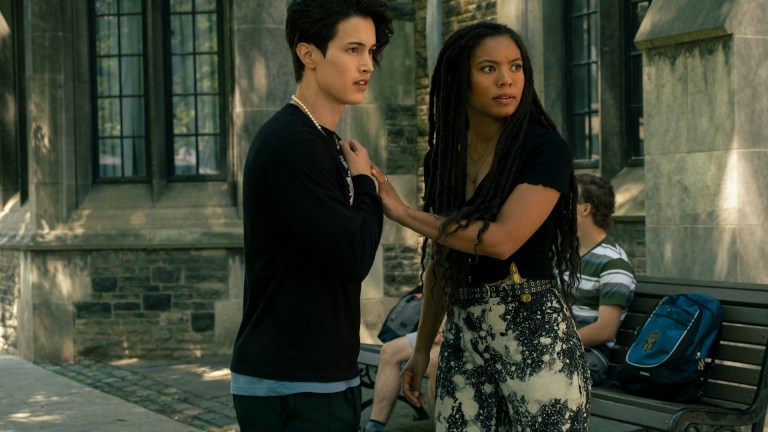The Hidden Power of Gen V’s Effortless Queerness
Like superpowers, queerness is a normal part of life for the students of God U on Gen V.

This article contains spoilers for Gen V.
The Boys’ universe has become well-known for shocking deaths, bloody explosions, and corrupt superheroes. While the spinoff series Gen V has all of those things, and more, it also has an effortless queerness to it that The Boys has been lacking.
This isn’t to say that Queen Maeve’s (Dominique McElligott) arc in The Boys is terrible queer representation. It makes sense that she would have felt forced to hide who she was to keep her place in The Seven only for Vought to force her to come out to make themselves look progressive later on. Every part of Maeve’s identity is something for Vought to exploit, which The Boys does a great job of making abundantly clear.
But that’s what makes Gen V so refreshing in comparison. Queerness is just a normal part of life at God U and not something that these young characters feel like they have to make a big deal about. Jordan Li (Derek Luh and London Thor) is genderfluid and has different powers based on which gender they’re currently presenting as. While Vought and the faculty do have an issue with promoting Jordan higher in the school’s rankings because they don’t think their queerness will test well, the rest of the student body never seems to have a problem with it.
Marie (Jaz Sinclair) and Jordan’s romance is also incredibly normalized and feels like a true next step in their relationship rather than something forced upon them so that the show can check a few boxes. While they do have a few insecurities as their relationship progresses, neither of them seem worried about other people finding out about their queerness. This appears to be Marie’s first relationship, and rather than spending a ton of time worrying about what her feelings for Jordan mean, she just kind of rolls with them.
As someone who took years to embrace my own queerness and still struggles at times to accept my identity, I find it comforting that characters like Marie and Jordan are able to exist on TV. Gen V doesn’t try to hide their sexuality or make them feel ashamed of it, but it also doesn’t force them to make a big deal about it either. For the most part, they are able to just exist as they are and experiment with who they are and what they want.
Queerness is a normal part of life, as much as bigots across the U.S. and around the world would like to make people think otherwise. Stories that are explicitly about queer joy and exploring queerness are as important now as they were before, but it’s also important to see queer characters that are just existing in their world as they are.
Even though it feels like the U.S. is going backwards with regards to LGBTQ+ acceptance, queer people aren’t going anywhere. According to a Gallup poll (via Axios), a little over 20% of Gen Z adults (those born between 1997 and 2003) claim an identity under the LGBTQ+ umbrella – that’s 1 in 5 people from this generation alone. Comparatively, only 10.5% of Millennials and 4.2% of Gen X identify as LGBTQ+.
This doesn’t necessarily mean that Gen Z is more queer than other generations – it’s more likely that due to the rise in acceptance of queer identities during our lifetime, that we were able to embrace who we are earlier in our lives than other generations. This dichotomy is clear when looking at The Boys and Gen V. Maeve was made to feel ashamed of who she was for most of her life. Jordan and Marie don’t appear to feel that same pressure to fit into a mold of who other people think they should be.
Like real world Gen Z, the youth of Gen V also have to deal with the fact that their lives have been drastically affected by older generations without their input or control. In the real world, Gen Z has to contend with the growing reality of climate change and how our futures have been disposable in the eyes of corporations. In Gen V, the young supes have to deal with the fact that they were created by a corporation as a commodity with no regard for what they may have wanted out of their lives.
Gen V’s subtle queerness may not feel revolutionary necessarily, but it’s a positive step forward for queer representation. The way that Jordan and Marie are written feels effortless and natural. They are fully-realized people, not caricatures of queerness thrown in for the sake of making the show more progressive. Like in the real world, their queerness is an important part of their identity, but not the sum of who they are.
For many of us in Gen Z, we don’t feel like we have the time to care about “traditional values” or what our predecessors think of us and who we choose to love. This sentiment echoes throughout Gen V as Jordan, Marie, and the other students of God U try to pave their own way through a world that doesn’t really seem to care about them or their future. Embracing queerness may have once felt like a luxury to some, but for us it’s a necessity – a way to prove that we’re not going anywhere.
New episodes of Gen V premiere Fridays on Prime Video, with the season 1 finale premiering Nov. 3.
